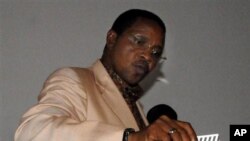With unofficial results being released, Tanzania President Jakaya Kikwete looks set to begin a second term in office, but delays in the tallying process have raised tensions around the country and observers are concerned about the vote's transparency.
On Sunday, Tanzanian voters participated in the country's fourth national election since the re-introduction of multi-party politics in 1992.
Voting proceeded peacefully, in what analysts billed as the closest political contest in the country's history. But the Tanzanian public is awaiting the release of official results, and questions are being raised about the process.
"We are concerned by the delays in the announcement of the results as this creates unnecessary uncertainty and suspicion among the electorate, and we have serious concerns about the transparency of the electoral decision-making and aggregation process," said the European Union's Chief Observer, David Martin.
Martin emphasized the concerns were the result of preliminary observations and not part of the team's final report. He said the EU observation mission will remain in the country to observe the aggregation process, final results and post-election developments.
According to Tanzania's electoral commission, final numbers are due by Friday at the latest. But many expected the official results to be announced much sooner. The wait has caused tension and sparked some clashes across the country.
Protests in the capital, Dar es Salaam, as well as Mwanza and Arusha have been dispersed with teargas from Tanzanian police, though no injuries have been reported.
Preliminary results released since Sunday show a strong lead for current President Jakaya Kikwete. Many analysts expected Mr. Kikwete to win a second term, but opinion polls taken in the lead-up to the vote showed a narrow lead over main opposition candidate Wilbrod Slaa.
The initial results also indicate the ruling Chama Cha Mapinduzi Party could lose as many as 51 seats in the Tanzanian parliament, while holding on to its majority.
Officials from Chama Cha Mapinduzi have accepted the results being released; saying the loss of seats was expected.
President Jakaya Kikwete was elected in 2005 with more than 80 percent of the vote. In 2010, Mr. Kikwete faced stiff challenges from Slaa and five other candidates, who criticized the president for not delivering on previous promises.
In 2005, Mr. Kikwete campaigned on a platform of anti-corruption. During his first term major corruption scandals were revealed, which cost Tanzania hundreds of millions of dollars.
Tanzania's Ruling Party Expects to Win Election








